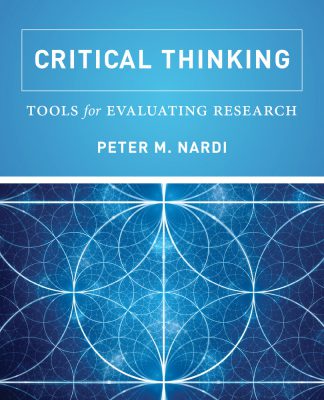 Claremont, Calif. (August 21, 2017)—Professor Emeritus of Sociology Peter Nardi’s new book, Critical Thinking: Tools for Evaluating Research, gives students the tools they need to analyze and interpret the vast quantities of information they process during their undergraduate years. The 168-page volume, published by the University of California Press, is a concise primer written for college and secondary school students who are honing their analytical-reasoning skills and formulating research methodologies in the digital age.
Claremont, Calif. (August 21, 2017)—Professor Emeritus of Sociology Peter Nardi’s new book, Critical Thinking: Tools for Evaluating Research, gives students the tools they need to analyze and interpret the vast quantities of information they process during their undergraduate years. The 168-page volume, published by the University of California Press, is a concise primer written for college and secondary school students who are honing their analytical-reasoning skills and formulating research methodologies in the digital age.
“This book gives people the tools to analyze the evidence that should either support, or refute, the claims being made by the media, by academic journals, by Twitter,” Nardi said. “As a critical thinker, you need to know what questions to ask to evaluate the validity of claims being presented as facts.”
Chapter by chapter, Nardi outlines strategies to help students scrutinize research studies and published pronouncements. The opening chapter, “Numeracy,” enumerates questions that should be posed about statistics and numerical claims: Are the right numbers being used? What is the sample size? Should one be talking about the mean or the median in this instance?
Take the one about a statistician walking into a bar. If you want to know the average income of patrons, you ask everyone their income, add them together, then divide by the number of people. But what happens if Mark Zuckerberg walks in? Suddenly, according to the mean, the statistician can now claim that the patrons’ average income is in the millions.
“It’s very easy to distort numbers,” said Nardi, who taught quantitative research methods at Pitzer and wrote the book Doing Survey Research: A Guide to Quantitative Methods based on his class lectures.
His chapter, “Fact, Opinion, and Logical Reasoning,” tackles the difference between fact and opinion. Nardi said that people often have a hard time distinguishing the evidence behind a claim from their emotional reaction to that claim. Opinion and fact blur together in a world where beliefs, information and speculation are shared at the speed of a keyboard click.
“This explosion of information raises the question not only of what is ‘fake news,’ but what is fake information? What are fake claims?” Nardi said. “When students read Facebook posts, how do they evaluate their legitimacy?”
Nardi emphasizes that the need to dissect evidence extends far beyond the realm of social media.
“It’s not just claims made on Twitter, it’s claims made in academic journals and scientific studies too,” he said.
Claims that carry popular currency—drinking wine before bed will help you lose weight, blueberries will ward off cancer—can be based on dubious and often contradictory studies. Nardi gives the example of the initial study on the link between measles, mumps and rubella vaccines and autism, which appeared in the prominent British medical journal, The Lancet; the study’s findings were based on a sample size of only 12 children and ultimately retracted.
Nardi’s book includes critical-thinking tips, and he ends each chapter with exercises so readers can take their analytical-reasoning skills for a trial run.
“My goal was really to write a book for students,” Nardi said. “I taught for 33 years at Pitzer, and I was dedicated to teaching, so I want my writing to take the same approach.”
The book is designed for college students and also for high school seniors who may be required to take classes in critical thinking. Often first-year college students are asked to read studies before they have taken a course in research methods, Nardi said. His book provides the basic skills they will need to interrogate information and scrutinize the sources in introductory courses.
Nardi created the companion website https://criticalthinkingtext.wordpress.com/ to guide students through the book and provide additional resources and readings about topics covered in the book, which cover the gamut of the social sciences, from sociology and psychology to political science and education.
Barry Glassner, the author of The Culture of Fear, says Critical Thinking also has a place outside of the classroom.
“At once rigorous and entertaining, thorough and precise, Peter Nardi’s book provides an invaluable toolbox for everyone who wants to free themselves of needless fears, misinterpretations and mental manipulation by politicians, marketers and pseudo experts in the news media.”
Critical Thinking: Tools for Evaluating Research is available through the University of California Press, Amazon and other booksellers.
About the Author:
 Pitzer Professor Emeritus of Sociology Peter Nardi
Pitzer Professor Emeritus of Sociology Peter Nardi
Peter M. Nardi, a sociologist whose expertise ranges from research methods to media and gay studies, is the author of Doing Survey Research: A Guide to Quantitative Methods, soon to be released in its fourth edition by Routledge, and Gay Men’s Friendships: Invincible Communities (University of Chicago Press). In addition to editing five anthologies in men’s and gay studies, he has served as both the president of the Pacific Sociological Association and the editor of the journal Sociological Perspectives. Nardi, who began teaching at Pitzer College in 1975 and retired in 2008, taught classes including Survey Research Methods, Media & Society and Men & Masculinity. Nardi earned his PhD at the University of Pennsylvania, his MA from Colgate University and his undergraduate degree from the University of Notre Dame.